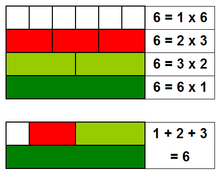Perfect number
In number theory, a perfect number is a positive integer that is equal to the sum of its proper positive divisors, that is, the sum of its positive divisors excluding the number itself (also known as its aliquot sum). Equivalently, a perfect number is a number that is half the sum of all of its positive divisors (including itself) i.e. σ1(n) = 2n.
This definition is ancient, appearing as early as Euclid's Elements (VII.22) where it is called τέλειος ἀριθμός (perfect, ideal, or complete number). Euclid also proved a formation rule (IX.36) whereby is an even perfect number whenever is a prime of the form for prime —what is now called a Mersenne prime. Much later, Euler proved that all even perfect numbers are of this form.[1] This is known as the Euclid–Euler theorem.
It is not known whether there are any odd perfect numbers, nor whether infinitely many perfect numbers exist.
This definition is ancient, appearing as early as Euclid's Elements (VII.22) where it is called τέλειος ἀριθμός (perfect, ideal, or complete number). Euclid also proved a formation rule (IX.36) whereby is an even perfect number whenever is a prime of the form for prime —what is now called a Mersenne prime. Much later, Euler proved that all even perfect numbers are of this form.[1] This is known as the Euclid–Euler theorem.
It is not known whether there are any odd perfect numbers, nor whether infinitely many perfect numbers exist.





No comments:
Post a Comment